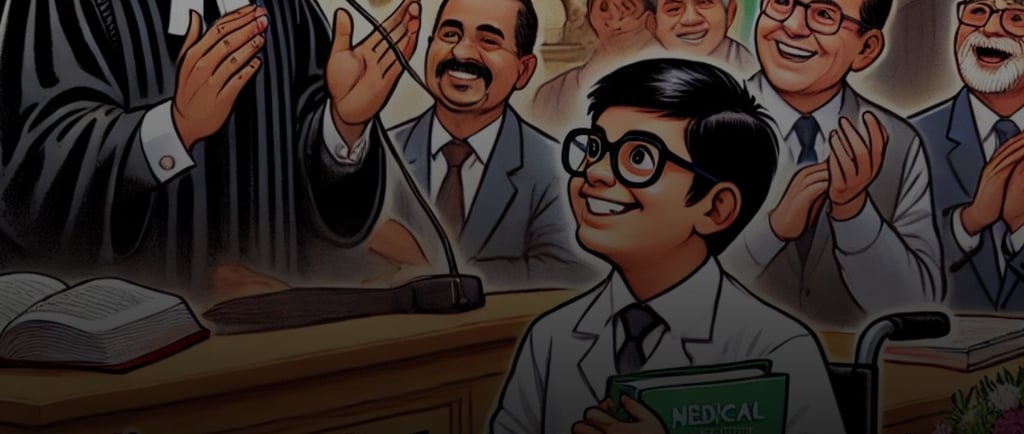Supreme Court Upholds Rights of Disabled Student, Directs Admission to MBBS Course
New Delhi, February 21, 2025 – In a landmark ruling, the Supreme Court of India has upheld the rights of a person with disabilities (PwD) to pursue a medical career, setting aside the Punjab and Haryana High Court’s order that denied admission to a student named Anmol in the MBBS course. The Court emphasized that a mechanical and restrictive interpretation of disability guidelines should not become a barrier to educational opportunities.
2/25/20252 min read


The case revolved around Anmol, a bright student who had secured a commendable rank in the NEET-UG 2024 exam under the PwD category. Despite meeting the required cut-off, his application was rejected by the Disability Assessment Board at Government Medical College, Chandigarh. The board declared him ineligible solely on the basis of a quantified disability percentage, without assessing his functional capabilities. Anmol challenged this decision before the High Court, which upheld the board’s findings, stating that courts should not interfere with expert opinions.
Upon appeal, the Supreme Court took a progressive stance, calling for an independent assessment by a specialized committee at the All India Institute of Medical Sciences (AIIMS), New Delhi. The committee was directed to include Dr. Satendra Singh, a noted disability rights advocate. The AIIMS board’s majority report echoed the existing National Medical Commission (NMC) guidelines, which mandate that a candidate must have "both hands intact" to be eligible for medical studies. However, Dr. Singh dissented, providing a detailed evaluation of Anmol’s abilities and demonstrating that, with clinical accommodations and assistive technologies, he could successfully complete his MBBS degree.
The Supreme Court strongly criticized the rigid application of NMC guidelines, noting that such rules reinforce ableism and contradict the principles of equal opportunity enshrined in the Constitution and the Rights of Persons with Disabilities Act, 2016. The Court emphasized that education institutions must focus on a candidate’s functional ability rather than a mere numerical assessment of disability.
Referring to past judgments, including Omkar Ramchandra Gond v. Union of India (2024) and Om Rathod v. Director General of Health Services (2024), the Supreme Court reaffirmed the importance of “reasonable accommodation” for persons with disabilities. It ruled that educational institutions and disability boards should not act as gatekeepers denying access to students but should facilitate their inclusion.
The Court also took note of the Union of India’s earlier directive to the NMC, urging a revision of its disability guidelines. It directed the NMC to formulate new, inclusive policies by March 2025 to ensure that the current regulations do not unjustly exclude capable students with disabilities from medical education.
With this ruling, the Supreme Court not only secured Anmol’s admission to Government Medical College, Sirohi, Rajasthan, but also reinforced the broader principle that disability should never be a disqualifier when reasonable accommodations can enable equal participation.
The case has been scheduled for further review on March 3, 2025, to ensure compliance with the directive for revised NMC guidelines.
This judgment marks a significant victory for disability rights and sets a precedent for future cases concerning inclusive education in India.
